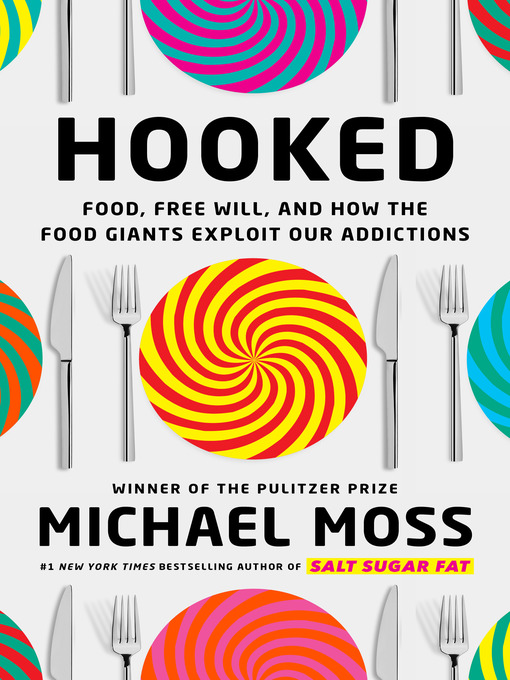
Hooked
Food, Free Will, and How the Food Giants Exploit Our Addictions
- اطلاعات
- نقد و بررسی
- دیدگاه کاربران
نقد و بررسی

December 15, 2020
A hard-hitting follow-up to Salt Sugar Fat (2013). Pulitzer Prize-winning investigative journalist Moss is a powerhouse when it comes to research and analysis, and much like his contemporary Michael Lewis, he possesses the ability to maintain a solid narrative arc. Characteristically, the author opens his deep dive back into the processed food industry with a story about a Brooklyn schoolgirl whose craving for McDonald's led to morbid obesity during adolescence. In addition to examining the chemistry of food, appetite, and addiction (highly prevalent), Moss breaks down the complex and contentious arguments at the intersection of the food industry and the law. More disturbingly, he explores the often devious and potentially dangerous ways that manufacturers manipulate foods to trigger addictive behavior, spark sense memories of foods from our childhoods, and treat addiction and dependence as a corporate strategy--much like the tobacco industry. The author covers much of the same ground as his previous book, but readers will be engaged and shocked by the sheer velocity of the process for changing foods to boost consumption. "In a sense, we've become unwitting allies to the processed food industry, and not just by falling for their marketing tricks," he writes. "We've allowed them to tap into and take advantage of all the biology we inherited from our forebears, including our love for variety and the cheapest source of calories, as well as the dramatic shifts in our work and family life that have played right into the companies' hands. When we changed the way we ate, they changed their food to exploit that." From maltodextrin to trans fats to a diet industry largely owned and controlled by the same companies manufacturing unhealthy, processed foods, Moss takes a second shot at corporate villains and once again finds a soulless industry hard at work. Another cleareyed inquiry into the companies that feed us, hook us, and leave us wanting more.
COPYRIGHT(2020) Kirkus Reviews, ALL RIGHTS RESERVED.

January 18, 2021
Food is a drug, and its manufacturers are tempting consumers into addiction, according to this contentious exposé by Pulitzer-winning journalist Moss (Salt Sugar Fat). The author explores the science behind the notion that food is addictive in its effects on the body and mind: MRI scans show the brain lighting up at the thought of a cheeseburger much like it does at a snort of cocaine, while sugar, salt, and fat activate receptors that prompt the brain to generate a rush of pleasure. Moss argues that Kraft Heinz, Coca Cola, Nestlé, and fast food companies exploit weaknesses to stoke gluttony by adding copious amounts of sugar, salt, and fat to their products, and tantalizing consumers with novel artificial flavors. He also shows how advertising can manipulate memory: in one experiment, subjects viewed a Wendy’s ad that “played up the restaurant’s playgrounds for kids,” urging consumers to relive those memories—most subjects didn’t catch that Wendy’s never had playgrounds. With his usual blend of lucid exposition and sharp-eyed reportage from corporate test kitchens, supermarket aisles, and fast-food counters, Moss provocatively suggests that human will-power is helpless against corporate puppeteers toying with humans’ neurochemical and digestive strings. Readers are sure to find much fascinating—and frightening—food for thought in this fast-paced survey.

February 15, 2021
Pulitzer Prize-winning journalist Moss previously exposed the food industry's manipulation of consumer behavior in Salt Sugar Fat (2013). Here, his ""aim is to lay out all that the companies have done to exploit our addiction to food so that we might reverse engineer our independence."" To center his addiction query, Moss looks to the tobacco industry's relatively recent admission that their products are addictive, and to understand why we might be primed to rely on fast, cheap, caloric food he goes much further back, to see what we can surmise about our evolving tastes from the four-million-year-old skeleton of our ancestor, Ardi. Along the way, Moss also investigates human biology and genetics, food's ties to memory, and lots of scientific and food-industry studies. Rather than a dieting manual, this is a guide to healthy disillusionment. Moss reminds us that when it comes to these multinational corporations, ""a commanding force in our lives going to great lengths to maintain the belief that our disordered eating is on us,"" our awareness as consumers is priceless.
COPYRIGHT(2021) Booklist, ALL RIGHTS RESERVED.

March 1, 2021
In this latest work, investigative journalist Moss, author of the best seller Salt Sugar Fat, offers a critical look at the food industry, and how political interests have manipulated and manufactured our eating habits. Ranging from human evolution of nutritional preferences and digestion to the science behind addiction to marketing and law, Moss deftly covers the complex landscape behind the convenience of fast food and its hold over consumers. The author brings his expertise as an investigative reporter to list how mass food production impacts our lives in ways we might not even realize, from additives (such as new chemical compounds), conveniences (packaging that consumers can hold in one hand and place in a cup holder) and marketing (commercials, colors, and phrasing) intended to drive consumers to purchase more and more. Along the way, he highlights several of the legal, social, and public health concerns surrounding these unseemly industry practices and makes the case that the workings of the food industry are intertwined with our declining public health. VERDICT Similar to his previous book, the latest by Moss will draw in fans of investigative journalism, and all interested in learning more about the inner workings of the companies we support.--Rachel M. Minkin, Michigan State Univ. Libs., East Lansing
Copyright 2021 Library Journal, LLC Used with permission.




دیدگاه کاربران